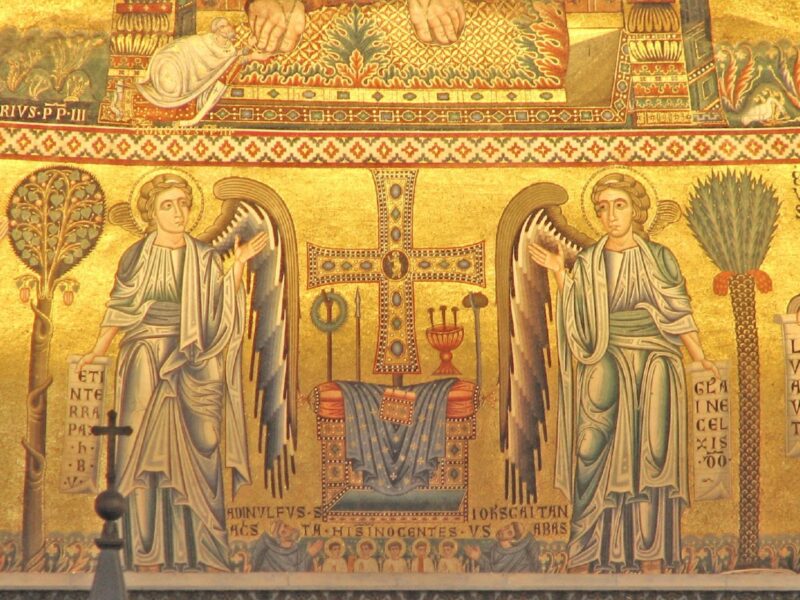
An Intentional Church
Fourteenth Sunday of the Year. Fr Toby Lees preaches on the sending out of the seventy-two.
An excellent book that I’m reading has the title, My Brain Has Too Many Tabs Open, and I can tell you the struggle is real. I never intended to get 99 tabs open on my browser (that’s the maximum number my phone permits) and sometimes when I’m online I find that I have forgotten exactly what it was that I got my phone out for in the first place. Frequently, when I take out my phone I do a quick precursory check for messages, then emails, then quickly the sports headlines, and then whatever it was I intended to do and sometimes I don’t remember what it was. And I do it without thinking. That’s one of the most disturbing aspects of online life, quite how unintentional it is. I think it’s profoundly inhuman: we just react to stimuli. I think if you were to map our online life into real world, you’d end up with something that looked like a dog in a park, running this way and that, sniffing one thing and then another, but quite impossible to say what the direction of the travel was or the actual intent.
And this is dangerous because so much more of our lives is spent online than it used to be and so much if we’re not careful gets treated as inconsequential, as seconds turn into minutes and the minutes turn into hours, especially when scrolling and looking for who-knows-what? Presumably something big enough to truly captivate albeit rarely finding it where we’re looking.
This can change the way that we read Scripture, we breeze through it, and easily miss that things of real consequence are contained in the smallest of details. We wait until something grabs us and lose so much in the details. Last week I was preaching on significance of Peter’s declaration of faith occurring at Caesarea Philippi, the declaration of Jesus as the Christ and the Son of the Living God at a site of a pagan temple dedicated to Augustus Caesar, the adopted son of the dead Caesar posthumously declared a god.
This week, as we hear about the sending out of seventy-two, perhaps our immediate tendency is to breeze past focusing on the instructions for their mission and the fruits it yielded. But, in a world in which we increasingly hear the refrain that ‘Christ didn’t come to found a Church’, the sending of seventy-two is of real significance.
In Exodus 24, when Moses is establishing the old covenant, he chooses 70 elders (in Greek presbyteroi) to act as priestly mediators between God and the twelve tribes of Israel, and they go up Mount Sinai with Moses to offer sacrifice on behalf of the people. Later on, in Numbers 11:16-30, we read how Moses took these elders and appointed them to help him administrate and govern this great number of people travelling with him in the wilderness. And crucially, when he does this, we’re told that the spirit comes down upon them and that they are anointed to lead the people of Israel. Two men outside the camp, Eldad and Medad, also receive the Spirit, giving us a total of seventy-two. What we see taking shape is a priestly hierarchy with the seventy-two underneath Moses and the twelve leaders of the twelve tribes of Israel.
And there’s more, because in Genesis 11, in the genealogy of the sons of Noah, in which we hear all the nations that are descended from Shem, Ham, and Yaphit – a list referred to as ‘the table of nations’ – the gentile nations number seventy-two.
Jesus’s appointing twelve apostles and then sending out seventy-two to extend the mission to the gentiles cannot be an accident for someone so steeped in the Scriptures, and he would have been well aware of the symbolism of this number at a time when the Sanhedrin also numbered seventy. He’s not only showing himself to be the new Moses but he’s also explicitly mirroring the priestly hierarchy of Moses (of which he was, after all, the ultimate author) and manifesting himself as the one high priest. That the Sanhedrin were so hostile to him suggests that the symbolism of this was not lost on them.
Jesus was deeply intentional in everything that he did and if he want to be more like him, this is something that we need to be too. I’m going to close some of those tabs and I’ll aim to get down at least to seventy-two if not twelve.
Readings: Isaiah 66:10-14 | Galatians 6:14-18 | Luke 10:1-12,17-20
Image: public domain via Internet Archive Book Images



Marion Jordaan
“…and sometimes when I’m online I find that I have forgotten exactly what it was that I got my phone out for in the first place.” So true. I can easily identify with this comment. I also loved your analogy about the dog in the park. Quite relevant too. Thank you for an inspiring and uplifting homily.
Frances Flatman
A helpful reminder over 72.
francis
A touching word for me. fr francis. mufulira. zambia.
John Peter Rosson (Priest)
This is a thoughtful reflection that helped me prepare to preach
this weekend in small parishes in the Diocese of Albany.
Thank you
Michael
There’s a real opportunity for me to fast from electronic media when I don’t open anything before I do my morning meditation and prayer.
Also the discipline of dealing with emails once a day like with my letter writing days ( only quicker) is something that helps me.
At 76 I’m lost without my phone for good scripture commentary when I’m reading but also when I’m attending mass
– I get to read and understand prayer and readings no matter what the abilities or cultural richness is also being brought into our liturgies.
God is always doing new things too.
Alejandro
I am hesitant about digging too deeply into numerical interpretations of scripture, as it can feel somewhat forced to me. My concern is that we might fall into what philosophers call the ‘accidental fallacy’: drawing conclusions from incidental details rather than essential truths. When we start overanalyzing biblical numbers – whether it’s the Jehovah’s Witnesses’ interpretation of the 144,000 or the mysterious 666 – we risk losing sight of the broader message. I don’t mean to be overly critical, but I worry about where excessive metaphorical interpretation might lead us. Regarding the increasingly common refrain that ‘Christ didn’t come to found a Church,’ I’d suggest its persistence stems from an underlying truth that isn’t without merit. After all, Jesus himself cautioned against the religious hierarchy of his time (Matthew 23:1ff), which lends some credibility to this perspective.